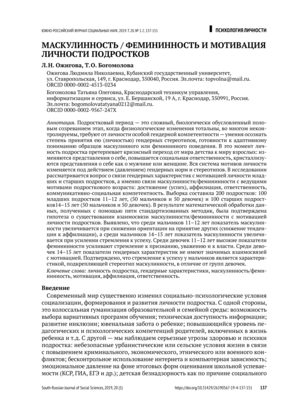Abstract
Adolescence is a very complex stage biologically conditioned by puberty during which physiological changes are extensive and impossible to control. They demand an especial gender competence, i. e., the ability to become aware of the extent to which an individual is ready to accept gender stereotypes and is able to understand and adapt the patterns of masculine and feminine behavior. At this point, the teen personality is subjected to a critical period of transition from the world of childhood to the world of grown-ups. It means that the teens’ ideas of themselves are changing, their social responsibility is rising and they begin to realize what it means to be a man / a woman. The whole system of a personality’s motives undergoes a radical change under the pressure of gender norms and stereotypes. The research analyzes the connection between gender characteristics, on the one hand, and the motivation of younger and older teens, on the other hand namely, the connection between masculinity/femininity and the basic motives of adolescence: success, affiliation, responsibility and communicative and social competences. We have questioned 200 teens. 100 of them were 11–12 years old (50 boys and 50 girls) and 100 were 14–15 years old (50 boys and 50 girls). The data-processing on the basis of five standardized techniques has proved the hypothesis about the existence of interrelation between masculinity / femininity and the teens’ motivation. The research has revealed that the masculinity index among 11–12 year-old boys grows if they are less other-directed; the masculinity index among 14–15 year-old boys, grows when they are aimed at aimed at success. High indices of femininity among 11–12 year-old girls accelerate their achievement motivation, i. e. their wish to be appreciated and respected, as well as their striving for power. For 14–15 year-old girls, the indices of gender characteristics are not explicitly interrelated with motivation. It has been proved that the boys’ striving for success corroborates the masculinity stereotype, as opposed to the girls’ to that of the girls.
Keywords
References
Бобкова, Т.С. (2014). Характеристика составляющих половой идентификации подростков в разных социально-педагогических ситуациях развития. Сибирский педагогический журнал, 4, 185–190.
Глушко, И.В. (2014). Социальное доверие в контексте межличностных отношений. Историческая и социально-образовательная мысль, 2 (24), 213–216.
Кулагина, И.Ю. (1999). Возрастная психология: развитие ребенка от рождения до 17 лет. Ун-т Рос. акад. образования.
Марченко, О.Ю. (2015). Особенности гендерной идентичности у школьников разного возраста. Педагогика и психология, 1, 37–41.
Норкулова, Н.Т. (2014) Мотив аффилиации как основной фактор формирования сплочённости молодёжных групп. Проблемы современного образования, 5, 116–127.
Обозов, Н.Н. (1990). Психология межличностных отношений. Киев: Лыбидь.
Ожигова, Л.Н. (2006). Психология гендерной идентичности личности. Краснодар.
Петронюк, И.С. (2015). Влияние социально-психологической адаптации подростков на становление их системы ценностей. Философские науки, 105–108.
Полянский, А.И., Сухарева, Е.А. (2017) Взаимосвязь показателя «соответствие гендерному стереотипу» с личностной тревожностью и самооценкой. Научные труды Московского гуманитарного университета, 3, 68–74.
Просвирина, Н.Н. (2015). Формирование ценностных ориентаций как условие психологической безопасности подростка. Концепт, 1, 24–29.
Родштейн, М.Н. (2017). Конфликт идеальных гендерных я-образов и реальных я-представлений учащихся подросткового возраста. Поволжский педагогический вестник, 3 (16), 72–79.
Урусова, Л.Х. (2014). Этнопедагогика: гендерные стандарты маскулинности. Вестник Кемеровского государственного университета, 41 (60), 96–98.
Урусова, Л.Х. (2015). Воспитание свободной личности: дифференцированный подход. Вестник Кемеровского государственного университета, 1–2 (61), 128–130.
Урусова, Л.Х. (2016). Когнитивная теория морального развития Колберга как условие успешной социализации современной личности. Вестник Восточно-Сибирского государственного университета технологий и управления, 4 (61), 167–171.
Фельдштейн, Д.И. (1972). Трудный подросток: некоторые психологические вопросы формирования личности детей подросткового возраста. Душанбе: Ирфон.
Хекхаузен Х. (2003). Мотивация и деятельность. Москва: Смысл.
Шаболтас, А.В. (1995). Методика диагностики мотивов занятия спортом в юношеском возрасте. Вестник СПбГУ, 3. 129–132.
Connell, R. (1987). Gender and Power: Society, the Person and Sexual Politics. Cambridge: Polity Press.
Daniels E., Zurbriggen, E. (2016). The Price of Sexy: Viewers’ Perceptions of a Sexualized Versus Nonsexualized Facebook Profile Photograph. Psychology of Popular Media Culture, 5 (1), 2–14.


